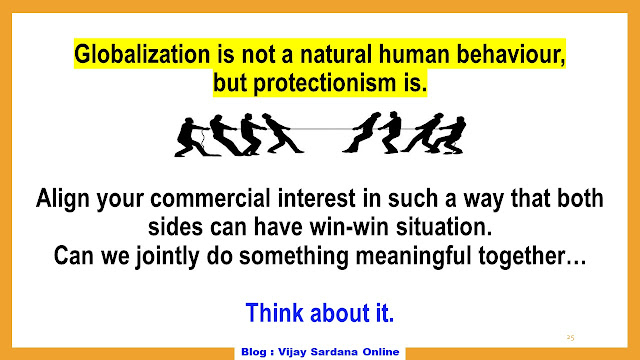Globalization and Protectionism in Global Trade at POTS, Malaysia
Globalization and Protectionism in Global Trade
This is my second opportunity to address the global audience from the POTS platform. Last time, it was on the Role of Foreign Funded NGOs and why development agenda of developing economies are targeted by global trading powers. You may watch that in full on Youtube in PalmTV section.
Today, I will discuss following issues in detail -
Let me start with basics -Globalization is part of many global seminar and conefrences, but the fact is all of these countries practice protectionsim. So, the facts are far away rom the discussion agenda. Those who preach the globalisation the most, distort the markets the most.
In 1776, Adamn Smith made gave a very simple logic in his book, "Wealth of Nations" and basis for globalization.
WTO also endorses the same, but no big power wants to follow the same with honesty. They want world should open the doors for them and their unfair trade practices should continue and no questions should be asked.
WTO is a poorly designed chess game, where rules are changed based on power of the country.
Globalisation ideology is surving because protectionism exist. Remove all unfair trade practices and distorting subsidies, globalization is a default option.
Please note 2011, is the turning point for world edible oil trade.
Subsidies is a most powerful example of protectionism, by the preachers of Globalisation. They will never remove subsidies because sensible and logical globalisation will ruin their agriculture. Don't expect any fair trade practice from them.
All developed markets are saturated. There is no potentai for future growth. They have to look for new markets without opening-up their own markets.
Production will continue to increase all over the world, but market is NOT growing in the same manner. This will create frictions in the trading partners.
The major consumtpion markets will remain in develping economies, but production will increase in all geographies.
Developing and least developed economies will demand more feed materials.Growth rate will come down in coming years.
Real income of oilseed farmers may come down in many countries with large production base but with limited domestic market.
India will continue to be the most important market for edible oil trade.
On the other hand, consumers are debating issues like GM foods, Sustainability, etc.
Future trend is favourable for global consumers but tough for global producers.
so, the drivers remain the same but intentions do not match due to various external factors like social and economic pressures.
The most developed nations and profound preachers of globalsation distort the world trade the most. Every month G-20 counties create at least 10 new non-tariff barriers in the world market under one pretext or the other to protect their own commercial and economic interests.
Can we expect sharks to turn vegetarian?





























Comments
Post a Comment